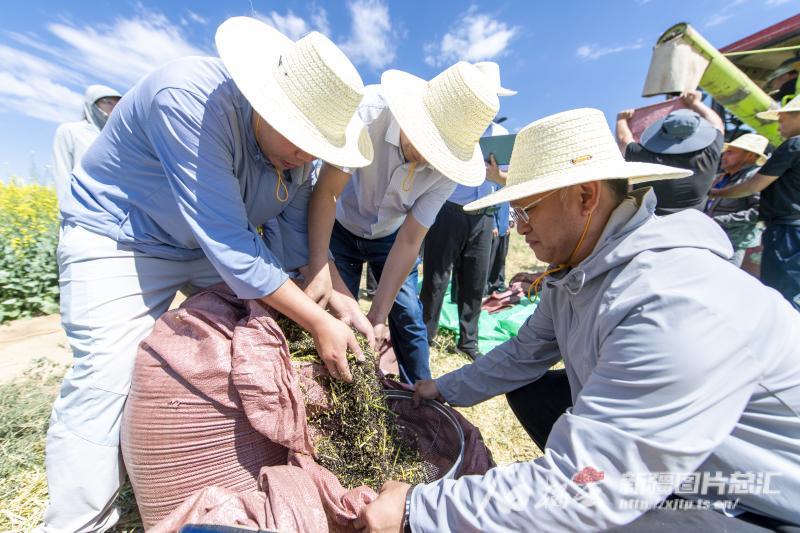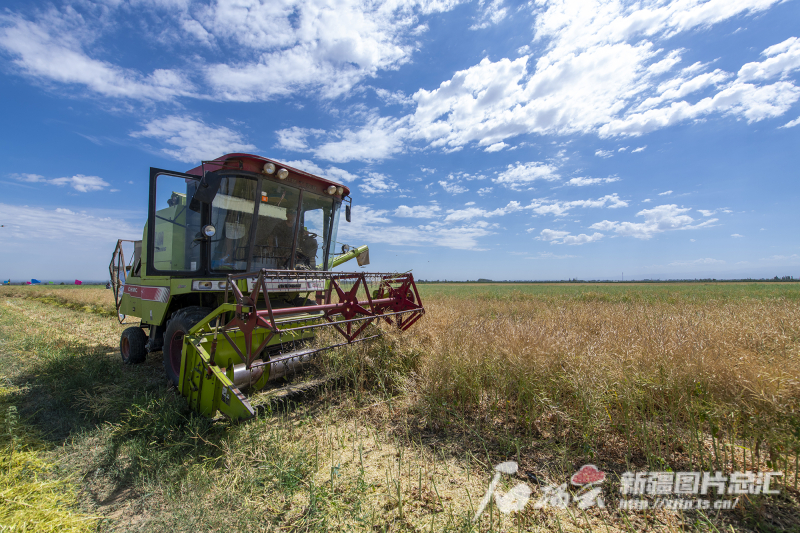Shiliuyun-Xinjiang Daily (Reporter Xie Huibian) news: The autumn-sown rapeseed yield in the demonstration field of 4 hectares in Jibuku Town, Qitai County, Changji Hui Autonomous Prefecture, northwest China’s Xinjiang Uygur Autonomous Region, reached 157.9 kilograms per mu, marking the success of planting autumn-sown rapeseed in saline-alkali land in Xinjiang.

Photo shows agricultural technicians carry out the actual yield measurement of 'Huayouza 158R' demonstration field. (Photo provided by Xinjiang Academy of Agricultural Sciences)
The yield measurement was conducted by experts from over 10 universities and research institutes, including Huazhong Agricultural University, on the experimental field cultivated by Xinjiang Academy of Agricultural Sciences' oilseed team.
The success of this experiment is primarily attributed to the research team's introduction of the exceptional variety "Huayouza 158R". Gu Yuanguo, Deputy Researcher at Xinjiang Academy of Agricultural Sciences, emphasized that this variety not only exhibits remarkable tolerance to moderate and severe salt-alkali stress but also successfully survives under unfavorable conditions as a result of low temperatures in winter and spring snowmelt. In conjunction with a series of effective cultivation techniques such as pre-winter synchronous sowing and fertilizing, drip irrigation for salt removal during seedling emergence, and growth promotion during rejuvenation stage, this variety has demonstrated significant yield potential and suitability for cultivation in northern Xinjiang.
It was learnt that the experimental site for this study is situated in heavy saline-alkali regions of northern Xinjiang. The primary approach employed involves a rotational system between winter wheat and autumn-sown rapeseed, which not only enhances the reclamation of saline-alkali land through proper resting periods but also optimizes the cultivation area and oil crop yield on these lands.
The secretion of organic acids by the rapeseed root system can activate insoluble phosphorus elements in the soil, thereby facilitating soil improvement. Additionally, rapeseed possesses the characteristic of being a halophytic plant, enabling it to absorb salt ions from the soil and effectively ameliorate saline-alkali land. It is worth noting that autumn-sown rapeseed requires less water and exhibits higher biomass production.
The team, led by Gu Yuanguo, aims to enhance oilseed yield in saline-alkali land across northern Xinjiang, thereby augmenting the benefits for local farmers. Subsequently, this model will be gradually extended to southern Xinjiang with the ultimate goal of achieving widespread implementation throughout the region while simultaneously maximizing economic gains through enhanced utilization of saline-alkali land.

Photo shows the actual yield measurement of 'Huayouza 158R' demonstration field. (Photo provided by Xinjiang Academy of Agricultural Sciences)
According to the data, Xinjiang is the region with the most extensive distribution of saline-alkali land in China, encompassing an area of 14.6 million hectares, which accounts for 40.6 percent of the national saline-alkali land area and 37.7 percent of Xinjiang's total cultivated land area. Over time, Xinjiang has progressively enhanced its saline-alkali land through diverse approaches such as subterranean drainage for salt elimination, water-fertilizer-salt regulation, cultivation of salt-tolerant plants, and promotion of organic fertilizers to unlock the comprehensive utilization potential of saline-alkali land and augment agricultural production capacity.
(A written permission shall be obtained for reprinting, excerpting, copying and mirroring of the contents published on this website. Unauthorized aforementioned act shall be deemed an infringement, of which the actor shall be held accountable under the law.)









